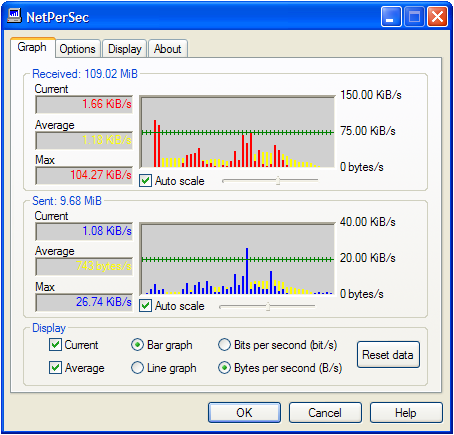Netpersec For Mac
How fast is your Internet connection, really? Clock your connetion speed.
Netpersec For Mac Pro

Different types of connections promise different communication speeds, but is this what you're actually getting?, lets you check your connection speed in real time. Its dynamic tray icon shows send and receive activity with a bar graph or a histogram. You can also view current and average send and receive speeds in a configurable, graphical display. By Mark Sweeney NetPerSec configures itself automatically and will detect your current access medium to the Internet - modem or network interface card. You can start and stop NetPerSec at any time and do not need to restart your Internet connection. NetPerSec also monitors all TCP/IP activity whether it is over the Internet or on an internal LAN, or WAN, network. NetPerSec displays data throughput using both bits per second and bytes per second in conjunction with the standard metric prefixes G, M, and k.
These prefixes have the following definitions: Decimal Values kilo (k) = 1,000 or thousand mega (M) = 1,000,000 or million giga (G) = 1,000,000,000 or billion When displaying bits per second, the metric prefixes are interpreted using their decimal values, as show above. However, when displaying bytes per second, the prefixes are interpreted using their binary values. Binary Values kilo (K) = 1,024 mega (M) = 1,048,576 giga (G) = 1,073,741,824 Note that the binary prefix for kilo uses the uppercase letter K while the decimal notation uses the lowercase k. An uppercase K is the standard method to indicate binary kilobytes. By convention, data transmission devices, such as modems and networks, are measured in terms of bits per second and use the decimal metric prefixes. Data storage devices, such as hard drives and memory, are measured in bytes, and use the binary metric prefixes.
NetPerSec uses the following terms and values in its calculations: Prefix Abbreviation Size bit= b= 0 or 1 Byte= B= 8 bits kilobit= kb= 1,000 bits (decimal) Kilobyte= KB= 1,024 bytes (binary) Megabit Mb 1,000,000 bits (decimal) Megabyte MB 1,048,576 bytes (binary) Gigabit Gb 1,000,000,000 bits (decimal) Gigabyte GB 1,073,741,824 bytes (binary) Therefore, if the current data throughput rate is 56 kbps, the binary equivalent would be displayed as 6.8 KBps. The calculation is performed using 56000(kbps) divided by 1024(KB) divided by 8(Bytes).
Windows NT 4, Windows 2000 If you are using Windows NT 4 it is suggested that you install service pack 4 or higher. Older versions of NT contain a bug in the SNMP interface which result in memory leaks.
Windows 95, Win98, WinMe If you are using Windows 95 you must have the Winsock v2.0 update and the Dialup Networking Upgrade installed. Both of these updates may be downloaded from. Troubleshooting If you receive an error message when starting NetPerSec, or if NetPerSec does not seem to be reporting network statistics, please verify the following. NetPerSec relies on two files in your system in order to work - INETMIB1.DLL and SNMPAPI.DLL.
Both of these files must reside in the Windows folder if you are running Windows 9.x, or in the System32 folder if you are running Window NT/2000. Please verify that these files are present and do not exist in other folders such as C: Windows System or C: WinNT. If you find duplicates of these files outside of the proper folders you will need to delete them to the Recycle Bin and restart your system. Certain combinations of network interfaces and drivers may cause NetPerSec to report double or more amounts for the data actually transferred. Please see the Network Interface section under the Options tab for details on how to correct this problem. If any viewpoints.